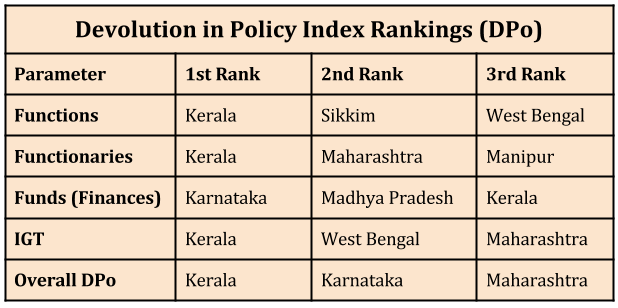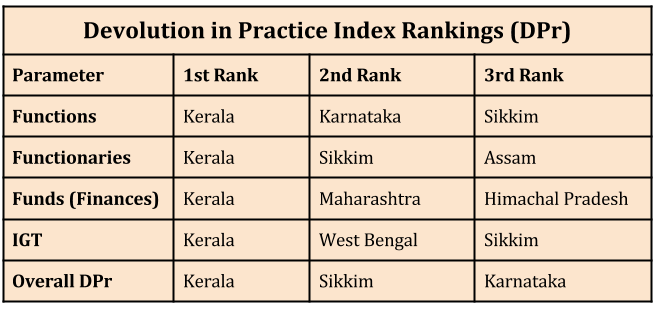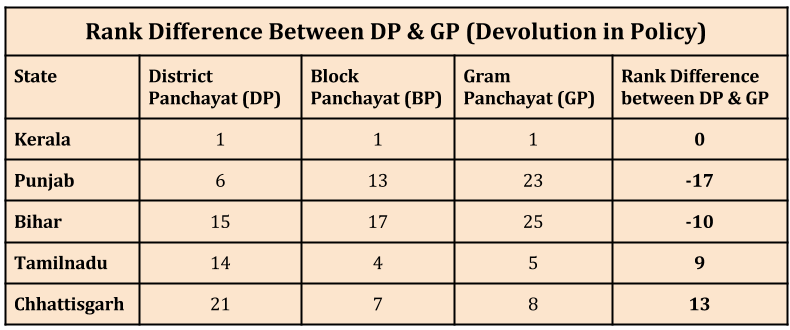[orc]Empowering local governments both in the Urban & Rural areas has been on the agenda for most governments. The 73rd & 74th amendments to the constitution have laid down the specific list of functions that can be transferred to the local governments. The Ministry of Panchayati Raj conducts an annual study, the Panchayat Devolution Index (PDI) to rank the states based on the status of devolution. Kerala has topped the list in 2014-15.
The 73rd amendment to the constitution is aimed at empowering rural local bodies (District, Block & Village Panchayats). This amendment put the onus of transferring 29 different functions as listed in article 243G, to the rural local bodies, on the state governments. More than 20 years after the amendment, think still look bleak with most states not transferring these functions to the local governments.
The Panchayat Devolution Index (PDI)
The Ministry of Panchayati Raj of Government of India has been conducting the annual study on The Panchayat Devolution Index (PDI) since 2006. The study is undertaken to assess where each State stands in the matter of devolution of powers to the Panchayati Raj Institution (PRIs) or the rural local bodies. The annual study looks at where the states stand in devolution of powers to the PRIs in terms of the 3Fs
- Functions – Effective transfer of functions as envisioned in the 73rd amendment
- Functionaries – Adequate number of functionaries to discharge the functions under the control of elected leadership
- Funds – Commensurate funds to discharge their functional responsibilities
The annual study for 2014-15 was undertaken by Tata Institute of Social Sciences (TISS). The study came up with two different indices for all the levels.
- Index of Devolution in Policy (DPo)
- Index of Devolution in Practice (DPr)
The DPo took into consideration the following indicators
- Percentage of detailed functions transferred to PRIs
- Number of functionaries per 1000 population
- Per capita fund available
- Infrastructure of Panchayats
- Transparency in Panchayats like publishing accounts, budget documents etc
The DPr on the other hand had indicators looking at actual practice. The study also included field trips to various institutions. The study was undertaken in 25 different states.
Kerala tops the list in all indices
As per the PDI report for 2014-15, Kerala tops the list on all the indices of the study. Apart from the 3Fs, the study also looked at IGT (Infrastructure, Governance & Transparency).
Kerala topped the overall Devolution in Policy (DPo) rankings. Kerala was found as the front runner in all the parameters except funds. Karnataka was the best in transferring adequate funds to the PRIs. Karnataka came second and Maharashtra came third. While Sikkim was found doing well in transferring functions, it ranked low on other parameters.
The Devolution in Practice (DPr), is more of a ranking based on actual implementation. In DPr, Kerala topped in all the parameters. Sikkim came second on overall DPr while Karnataka was third.
Difference in Ranking between various tiers of PRIs
The study also revealed an interesting facet with respect to the devolution process. There were stark differences in devolution between various tiers of PRIs. In 10 states, the District Panchayats were ranked better than the Gram Panchayats while in 11 other states, this was the exact opposite. Only in Kerala, Odisha & Arunachal Pradesh, there was no difference in the ranking of DPs & GPs. The difference was stark in Punjab, Bihar, Tamilnadu & Chhattisgarh.
Featured Image:[CC BY 3.0], via Wikimapia





